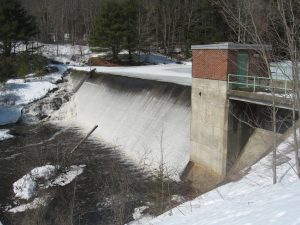Group Decision-Making Processes for River Systems

Institution: University of Maine
Sponsor: Maine Water Resources Research Institute (2018)
Evaluating Success in Group Decision-Making Processes for River Systems
Making effective and systems-based decisions about how to manage rivers is essential for balancing the multiple and competing values that rivers and dams provide, especially for including energy production, flood protection, fish habitat and more. For those making decisions, there is a need to have systematic ways of evaluating these values in order to take coordinated action, especially in the context of hydropower decisions.
New participatory approaches are increasingly being employed to support those making decisions about rivers, but there is limited understanding about how well such processes work or how to evaluate them. The research team is developing methodologies to analyze group participatory decision-making processes, including multi-criteria decision analysis (MCDA) and Participatory Systems Dynamics Simulation (PSDS), for decision-making involving dams and rivers.
The team’s overarching research question asks: How do researchers and stakeholders evaluate success in group decision-making processes, and what tools can help both participants and researchers improve their understanding of what works for different groups?
MCDA is a structured framework where decision makers can balance criteria and alternatives for specific decisions such as when to release water at a reservoir to increase downstream flows. Similarly, PSDS is an integration of systems dynamics modeling and role-play simulations in which researchers engage stakeholders in making a hypothetical but realistic decision about water use at a dam reservoir, supported by models. This project builds on existing research currently being conducted to examine how stakeholders interact with MCDA and PSDS processes when making decisions about water resource use as applied to dams and hydropower. The project extends that ongoing research to develop a set of guidelines (i.e. a rubric) to evaluate group participatory decision processes and resulting decisions. The product of this research will be a rubric collaboratively developed with stakeholders that stakeholders may use in their communities or organizations to facilitate group decision making, evaluate the relationships between process and outcome, and encourage best practices for participation in natural resource decisions. The researchers will also use the rubric to retrospectively examine the processes and outcomes of the MCDA and PSDS workshops used to help build the rubric. We expect this rubric to be useful to stakeholders and researchers outside of the water resources field as well.
Team Leader:
- Sharon Klein, Assistant Professor, Economics, University of Maine
Team Members:
- Bridie McGreavy, Assistant Professor, Communication & Journalism, Mitchell Center Faculty Fellow, UMaine
- Catherine Ashcraft, University of New Hampshire
- Weiwei Mo, University of New Hampshire
Graduate Students
- Emma Fox, Economics, UMaine
- Natallia Leuchanka, University of New Hampshire
- Tyler Quiring, UMaine
